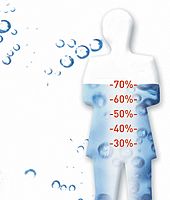Are You Chronically Dehydrated?
It's that time of year again'when people make New Year's resolutions about eating healthier. Reading more books. Starting a garden. Jogging around the block every day.

An estimated 75 percent of North Americans are chronically dehydrated and fail to drink the minimum eight glasses of water per day recommended by health and nutrition experts. Not good, considering water is the second most important nutrient to the human body next to oxygen. The body is made up of about 70 percent water, which plays a vital role in nearly every bodily process; water is essential for proper digestion and circulation, numerous chemical reactions, nutrient absorption, waste elimination and flexibility of the blood vessels. It regulates body temperature and benefits the skin by acting as an internal moisturizer, keeping the skin moist, supple and clear, as well as preventing premature aging due to toxic buildup.
Many people believe all liquids supply adequate hydration. Not true! Some beverages tend to dehydrate because of their caffeine and sugar content. Caffeine has a diuretic effect on the body, which makes you urinate more frequently than you usually need to very counter-productive to proper hydration. Drinks such as coffee, milk and juice all require water from the body to be properly digested. Alcohol and some medications can lead to increased fluid loss as well.
In the end, there is no substitute for water in providing the body what it needs for optimal cellular function. In many cases, when people are ill, eating or drinking anything is probably the farthest thing from their minds. Yet it's vital to maintain a good level of hydration to help the immune system fight off infection and assist in eliminating byproducts of any illness. Dehydration weakens the body's overall immune system and leads to chemical, nutritional and pH imbalances, which can eventually cause sickness and premature aging.
Many ailments classified as "diseases" respond well to proper hydration, including all conditions associated with diabetes, hypertension, high cholesterol, obesity and cardiovascular problems. Asthma, as well, can be the body's manifestation of dehydration, and can be prevented or controlled in many cases by simply getting enough water.
How Much?
Individual needs vary depending on factors such as climate, diet and exercise level, but an adequate amount of water is about 10 to 12 full glasses per day. Here's an ideal way to calculate: divide your body weight in half, then drink that amount in ounces (one ounce equals two tablespoons or 30 millilitres). Remember that although you may not need the full amount, drinking water adds no calories to your diet and can be great for your health.
We lose about three litres of water each day through perspiration, urine and respiration, which is why your body's stores must be continually replenished. Waiting until thirst hits isn't always the best idea; you're already dehydrated by then! A good gauge to see if you are drinking enough water is to check your urine. Unless you take B vitamins, your urine should be very pale yellow to almost clear. If it's dark in colour (and not because of excess vitamins), then increase your water intake.
Supposing you're one of those geared up to start a workout program this season, getting enough water should be an important concern. It's well known that, in hot climates and hot weather, athletes who don't stay hydrated can suffer from heat cramps, heat exhaustion and heat strokes. But contrary to myth, dehydration can occur at any time of the year, not only during the summer. The dryness that occurs during winter can dehydrate the body just as quickly as hot summer conditions. If you have ever experienced extreme tiredness, dizziness or poor co-ordination while exercising, this is probably because you were dehydrated and didn't know it. The simple solution is to drink more water before and during all exercise activities. And, of course, the easiest way to avoid dehydration at any time is to drink lots of water each day.
Symptoms of Dehydration
Mild:
- thirst
- dizziness
- light-headedness
- dry mouth and nose
- slowed urine production
Moderate:
- sunken, dry eyes with few or no tears
- poor skin elasticity
- rapid and deep breathing
- low blood pressure
- fast, weak pulse
Severe:
- fainting
- severe muscle contractions in the arms, legs, stomach and back
- convulsions
- heart failure
- kidney problems
- lack of urine
- cool, moist extremities
- low or undetectable blood pressure
- peripheral cyanosis (bluish skin)
- death
In severe dehydration, an individual will need to receive intravenous fluids to speed up the rehydration process and prevent cardiac arrest.
Water Tip
Train yourself to drink more water: in the morning, fill a two-litre jug with water and make sure it's gone by the end of the day.




